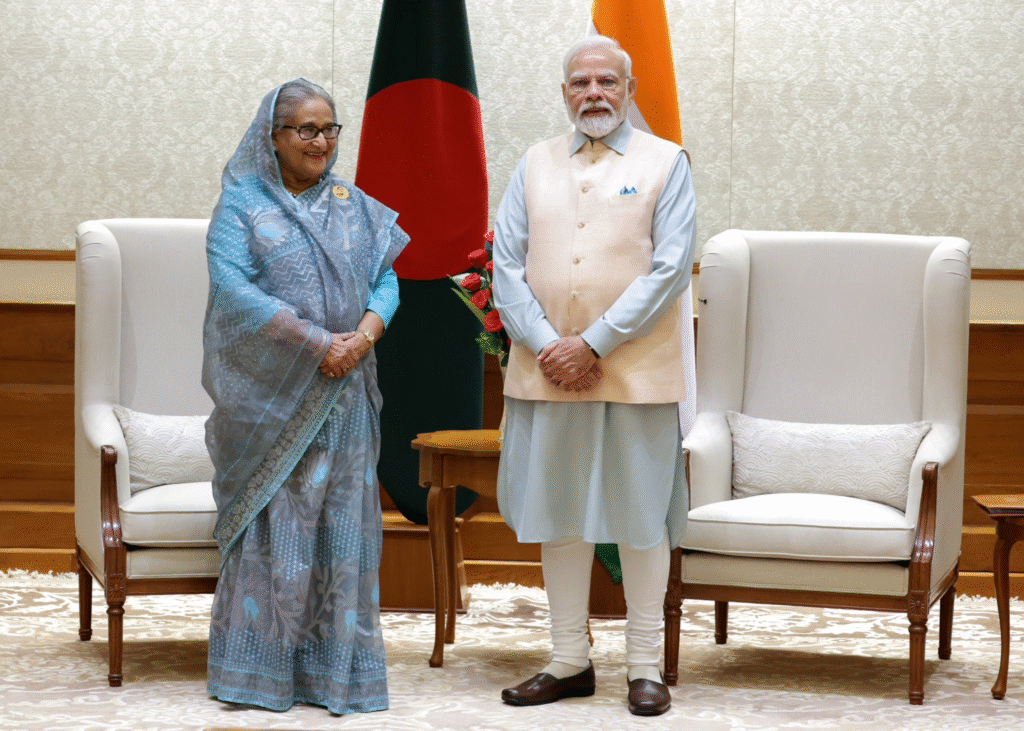Dhaka | November 2, 2025: Bangladesh’s International Crimes Tribunal (ICT-BD) has announced that it will deliver the long-awaited verdict against ousted Prime Minister Sheikh Hasina on November 17, in connection with charges of crimes against humanity. The decision comes amid heightened security and political tension in the capital, with the Awami League calling for a citywide lockdown on the same day.
The tribunal, led by a three-judge bench, made the announcement on Thursday, setting the stage for one of Bangladesh’s most politically charged judgments in recent history.

Hasina Tried in Absentia, Faces Five Counts
The 77-year-old former premier, who fled to India on August 5 following mass anti-government protests, is being tried in absentia. Alongside Hasina, her former home minister Asaduzzaman Khan Kamal and ex-police chief Chowdhury Abdullah Al-Mamun were charged under five counts of serious crimes, including murder, torture, and the extermination of protesters.
While Hasina and Kamal were declared fugitives, Mamun appeared before the tribunal and later turned state witness, reportedly assisting prosecutors in reconstructing events surrounding the violent suppression of the July Uprising—a student-led protest that ultimately brought down the Awami League government in August 2024.
Prosecution Seeks Death Penalty
Chief Prosecutor Mohammad Tajul Islam has demanded the death penalty for all the accused, alleging that Hasina ordered lethal force against unarmed demonstrators. The tribunal wrapped up hearings on October 23, after 28 working days of testimony from 54 witnesses, many of whom recounted chilling details of shootings, torture, and state brutality.
“The evidence clearly shows a systematic plan to silence dissent,” one prosecutor told reporters after the hearings concluded.
Dhaka on Alert as Army, BGB Deployed
The announcement of the verdict date triggered an immediate security clampdown in Dhaka. Authorities deployed army units, Border Guard Bangladesh (BGB) personnel, and riot police across sensitive zones surrounding the tribunal.
Witnesses described the capital as “eerily quiet,” with major roads deserted and many citizens choosing to stay indoors. Several private universities and institutions opted to shift to online operations fearing unrest, while long-distance bus services from Dhaka saw a sharp drop in passengers.
Hasina Calls Tribunal a “Kangaroo Court”
From exile, Hasina has denounced the tribunal proceedings as politically motivated. In an interview with PTI, she described the ICT-BD as a “kangaroo court run by men tied to her political rivals.” She reiterated her willingness to face trial before an internationally supervised court, even suggesting the International Criminal Court (ICC) in The Hague as an alternative.
“I have challenged the Yunus government to prosecute me before the ICC if it truly believes in justice,” Hasina said. “They won’t, because an impartial tribunal would acquit me.”
Her comments followed a growing international debate over the legitimacy of Bangladesh’s interim government led by Nobel laureate Muhammad Yunus, which Hasina’s party claims came to power through unconstitutional means.
Global Concerns Over Political Vengeance
Earlier this week, UK-based law firm Doughty House Chambers filed an “urgent appeal” to the United Nations, warning that Hasina’s trial is unfolding in an “environment charged with political vengeance.” The firm cited concerns over Bangladesh’s democratic vacuum and alleged suppression of opposition voices.
Last month, the Awami League submitted a complaint to the ICC, accusing the interim government of crimes against humanity, including arbitrary arrests, enforced disappearances, and violence against journalists.
Former foreign minister AK Abdul Momen also appealed to the UN Human Rights Council, alleging widespread political persecution and attacks on press freedom.
A Nation Divided Ahead of November 17
With just weeks left before the tribunal’s verdict, Bangladesh remains deeply divided. Supporters of Hasina view her as a victim of political retribution, while critics say accountability for the July Uprising is long overdue.
As November 17 approaches, the world’s eyes are once again on Dhaka — a city holding its breath for a verdict that could reshape Bangladesh’s political future.
